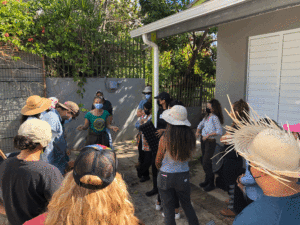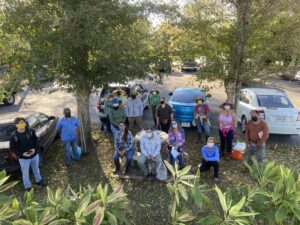Project Overview
Commodities
Practices
- Crop Production: fertilizers
- Education and Training: demonstration, farmer to farmer, technical assistance, workshop
- Pest Management: integrated pest management
- Soil Management: soil quality/health
Abstract:
Plenitud PR is an organization dedicated to teaching and demonstrating sustainability practices that promote a life in harmony with the environment. We carry out this mission through workshops, talks and community service across the island, and from our own farm and teaching center in Las Marías, Puerto Rico. We teach and demonstrate sustainability, permaculture and agroecology through such techniques as water runoff management practices for erosion prevention, agroforestry planting, compost systems, rainwater harvesting, intensive food planting and ecological bio-construction. We receive an average of 1,000 people a year who participate in workshops, internships, and 1-2 week apprenticeship programs, as well as volunteer programs and other educational activities. Our goal is to present viable sustainable alternatives to the many and increasing challenges faced by ordinary Puerto Ricans, such as climate change related natural disasters, economic uncertainty, and food insecurity. With the knowledge gained from our direct farm experience applying permaculture and agroecological practices, and through the experience gained in providing our educational programs, we have developed a 200 page agroecological manual, Siembra Boricua: Agricultura en Armonía con la Naturaleza (Translation: Manual for Agriculture in Harmony with the Natural Environment), complete with all the information and tools needed to produce food sustainably. This curriculum addresses the main challenges and key solutions through sustainable farming in a tropical climate, especially in Puerto Rico.
Despite the pandemic, our collaboration with SSARE has given us the means to further address the region's major food insecurity problem through intensive educational programs. This educational program has been based on the ¡Siembra Boricua! manual and we have equipped underserved beginning farmers with the tools needed to successfully and sustainably increase or begin local food production in Puerto Rico.
Through this SSARE supported project, Plenitud PR has offered: (1) 140 hour intensive agroecological training program accessible to 14 beginning or transitioning farmers; (2) 220 hour mentorship program for 2 participants of the previous intensive agroecological training program; (2) 7-month paid agroecological internship opportunities focused on sustainable intensive commercial production systems; continued to distribute the Siembra Boricua manual to be used as official curriculum for agriculture education. In the summer months we offered (1) 6-month internship on Nutrient Cycling and Agroforestry Systems Management and (1) 7- week internship on Small Scale Farm Administration ; developed new educational material that created sustainable and replicable programming for other small-scale farmers to use for many years to come.
Our educational objectives are designed not only to train future farmers in sustainable practices, but to generate sustainable, profitable programming that allow this work to continue beyond the scope of this project. Plenitud PR first offered our intensive agroecological training to provide theory and experience of key sustainable practices applicable to our tropical context, followed by additional focused group program opportunities, including a mentorship and internship, to more thoroughly train future sustainable farm managers. We have also created outreach components to disseminate the material more widely, and to increase visibility for the program so that it can be profitable and sustainable for years to come. Combined with our intensive production model, this approach generated sufficient income to repeat the program in the following years.
Project objectives:
A primary goal for this SSARE-funded project was not only to provide high quality intensive education to beginning and transitioning farmers for the period of the initial project, but also to implement the education in a way that is self-sustaining and easily replicable. We provided these trainings and opportunities for sustainable farmers as a yearly programmatic effort, and thus we have instituted several mechanisms to allow for a long shelf-life for both the materials and the educational programs we present below.
- Provided a 140-hour intensive agroecological apprenticeships to (14) new farmers.
- Provided a 220-hour intensive long-term professional mentorship to (2) selected participants from the previous apprenticeship to receive extra and personalized training on how to not just be sustainable producers, but how to run their own business as well.
- Provided employment for (2) individuals for a paid 7-month agroecological internship focused on intensive production systems.
- Provided (1) 6-month internship experience in Nutrient Cycling and Agroforestry Systems Management.
- Provided (1) 7-week internship experience in Small Scale Farm Administration.
- Tested and distributed our spanish sustainable agriculture book, “Siembra Boricua: Manual de Agricultura en Armonía con la Naturaleza” (Translation: Manual for Agriculture in Harmony with the Natural Environment) with the new farmers in the educational programs and outreach programs.
- Revised and developed new spanish sustainable agriculture educational material, for use in our educational initiatives described above, our outreach initiatives and for other programs to replicate and use.
Other Complementary Goals Accomplished:
- Sold and distributed over 6,000lb of fresh produce as a means of income to maintain profitability of the project and be able to test and show viability of small scale sustainable operations. This has given more credibility to the model when proposed to rising farmers.
- Used the high-tunnel production system, as well as our agro-forestry systems, organoponics, and other productive systems of the farm, as living laboratories for testing sustainable practices (part of the revision and development of the educational curriculum in our agroecology manual) such as: worm composting, organic fertilizers, pest control, soil amendments, etc.
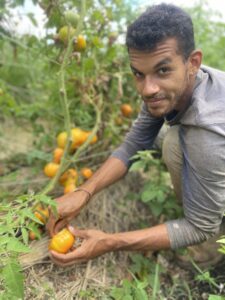
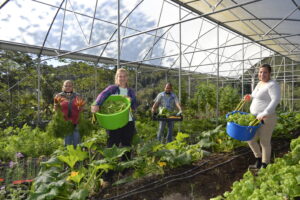
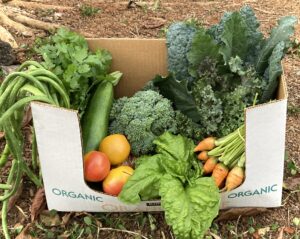
"Students of apprenticeship"

